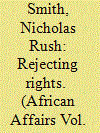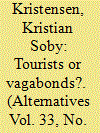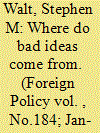|
|
|
Sort Order |
|
|
|
Items / Page
|
|
|
|
|
|
|
| Srl | Item |
| 1 |
ID:
119108


|
|
|
|
|
| Publication |
Oxford, Oxford University Press, 2005.
|
| Description |
x,158p.hbk
|
| Contents |
B
|
| Standard Number |
9780195307399
|
|
|
|
|
|
|
|
|
|
|
|
Copies: C:1/I:0,R:0,Q:0
Circulation
| Accession# | Call# | Current Location | Status | Policy | Location |
| 057157 | 303.6/UNI 057157 | Main | On Shelf | General | |
|
|
|
|
| 2 |
ID:
178134


|
|
|
|
|
| Summary/Abstract |
The necessity of making sense of our current moment, one characterized – as Andreas Bieler and Adam David Morton suggest – by the interconnected forces of global capitalism, global war and global crisis is clear. Given the continuing body counts attributable to the prioritisation of rapid economic and industrial growth over ecology, to the expansion of expeditionary and pre-emptive warfare, and to the liberalisation and deregulation of economies that has reduced social welfare safety nets around the globe to tatters, it is pertinent to ask, as Bieler and Morton do, ‘what had to have happened in the past for capitalism as a mode of production to emerge and consolidate?’.1 One of Bieler and Morton’s central aims in approaching this question is to revolt against the ‘violence of abstraction’, which drawing on Sayer’s seminal work,2 they describe as eschewing the fetishisation of concepts in favour of analysing social relations rooted in specific historical and sociological practices.3 Feminist scholars have similarly asked how patriarchy, as a set of power relations, has come about, and urged us to pay very close attention to how historical social relations in different parts of the world shape people’s presents. Just as Bieler and Morton argue that historical materialism ‘does not relegate the “economic” or the “political” to spatially separate spheres but conceives of the social constitution of the economy so that relations of production are embodied in juridical-political and ideological forms’,4 so too have feminists shown how the political, economic, juridical and ideological have worked with and through each other to substantiate patriarchal social relations that often normalise the spatial separation of social spheres. Although the book engages directly and productively with some branches of feminist thought, reflecting on points of convergence and divergence reveals some of the book’s blind spots and wider contributions. In my contribution to this forum, I consider what opportunities the book offers for rethinking feminist critique after the postmodern turn and in an age of crises, and what contemporary feminist theory in turn offers historical materialism. I ultimately aim to show how the present, and the historical and sociological forces that shape it, is necessarily both a historical materialist and feminist moment.
|
|
|
|
|
|
|
|
|
|
|
|
|
|
|
|
| 3 |
ID:
139632


|
|
|
|
|
| Summary/Abstract |
Academic and policy interest in the emergence, development, and efficacy of rights has increased substantially over the last twenty years. One particular effect that scholars have recently identified is the connection between the spread of rights across the globe and large-scale reductions in violence. While the expansion of rights may enable reductions in violence, the evidence in this article suggests the opposite may also be true. Drawing on ethnographic research on vigilantism in South Africa, a country deeply invested in the twentieth century rights revolution, the article shows how vigilantes have used the state's expanding rights regime to justify violence. Specifically, it examines the growth and spread of what was at one time South Africa's largest vigilante group, Mapogo a Mathamaga. Mapogo first emerged shortly after the country's transition to democracy and rapidly grew as its leadership preached a gospel that rejected rights, claiming that rights enabled crime and allowed immorality to proliferate. By assaulting suspected criminals, Mapogo's members claim that they are correcting the criminal, the post-apartheid state, and the flawed rights regime on which it is based, an outcome which the existing literature on rights and violence has difficulty explaining.
|
|
|
|
|
|
|
|
|
|
|
|
|
|
|
|
| 4 |
ID:
084700


|
|
|
| 5 |
ID:
100522


|
|
|
|
|
|
|
|